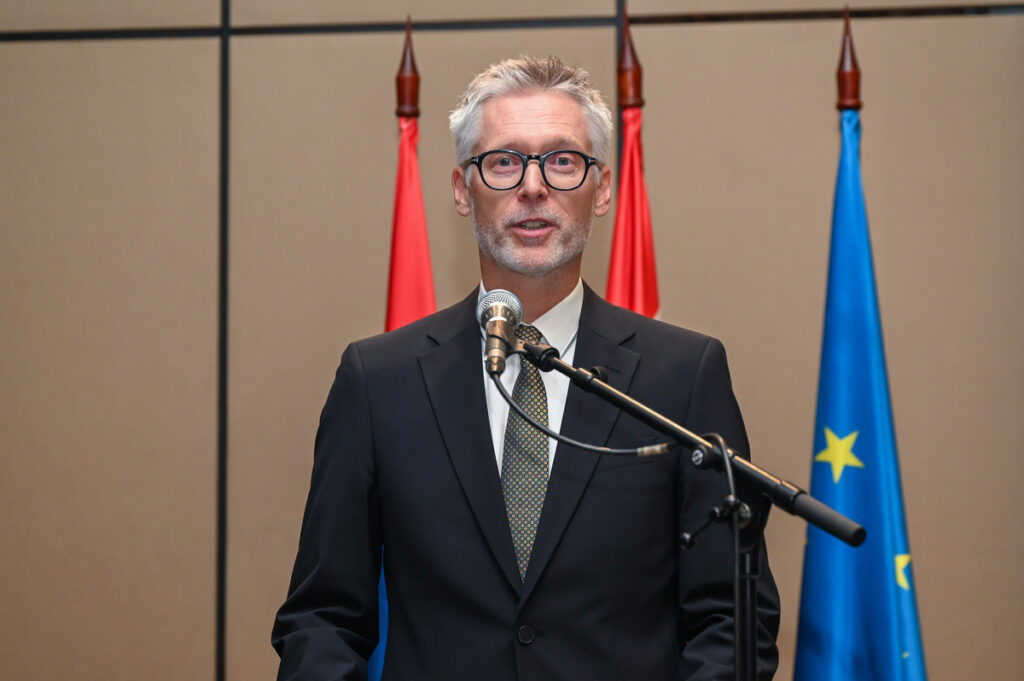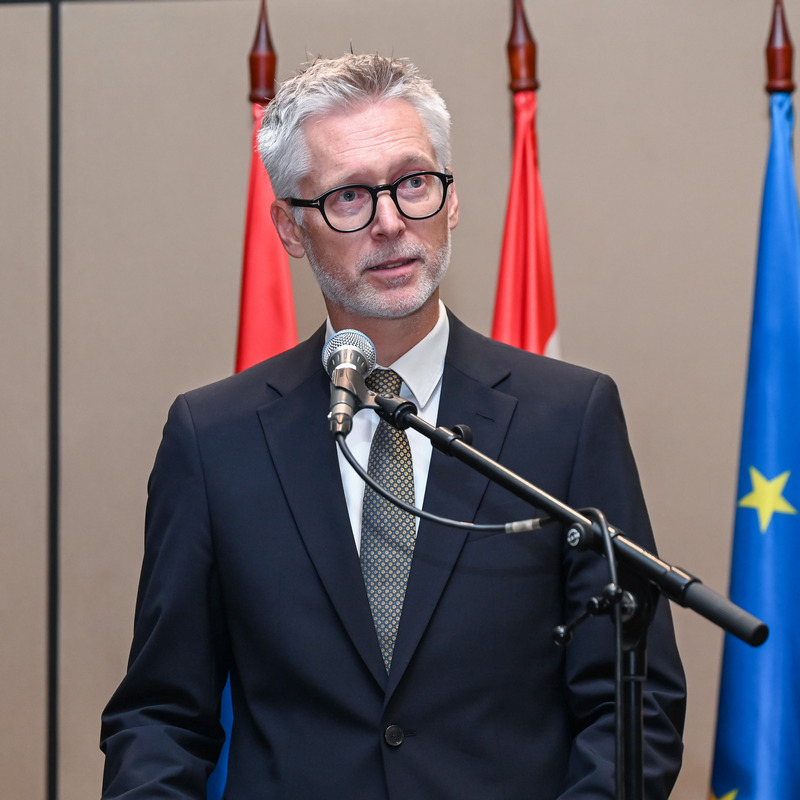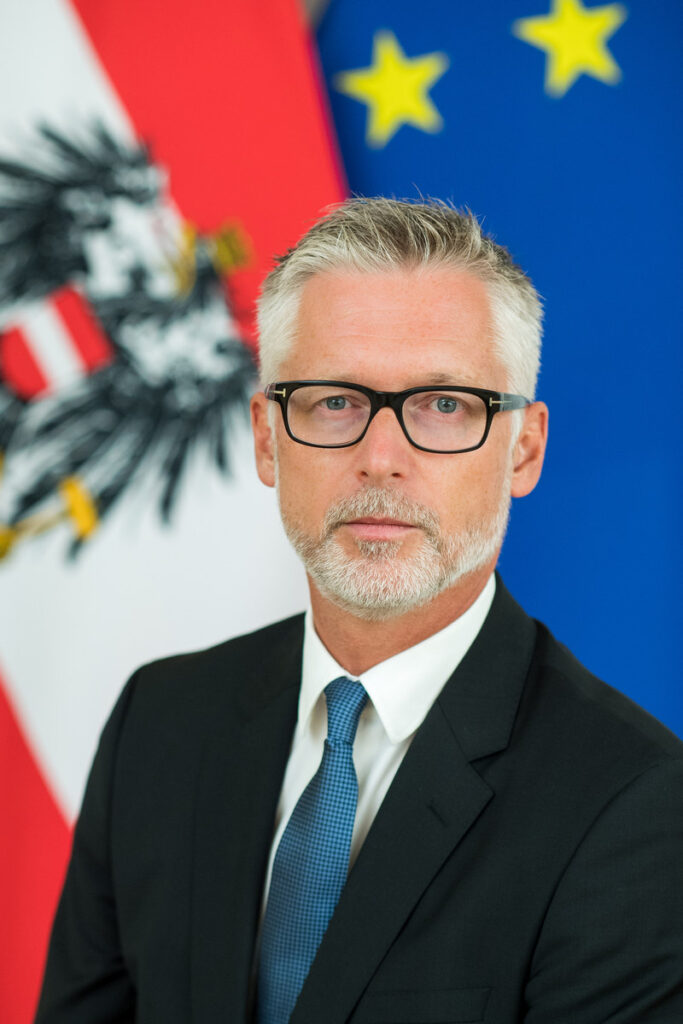Reforms, dialogue and shared responsibility for Europe’s future

AMBASSADOR’S INTERVIEW
by Dragan Nikolić
H.E. Christian Ebner
Ambassador of Austria to Serbia
On the occasion of Austria’s National Day, marked with a special feature in Diplomacy&Commerce magazine, we spoke with H.E. Christian Ebner, Ambassador of Austria to Serbia. In this interview, Ambassador Ebner discusses Serbia’s reform agenda, the importance of democratic progress and dialogue with Pristina, as well as the growing potential for cooperation in energy, digitalisation and culture.
Reforms must move faster across all key areas — that is the only way forward
How does Austria currently view Serbia’s role in the European integration process over the next 12 to 18 months? What specific steps do you expect from Belgrade to accelerate progress, and in what concrete ways can Austria support Serbia on that path?
It was only a couple of days ago that the European Commission presented the 2025 Progress Report for Serbia. The Report mentions, on the one hand, certain positive developments, such as the recent accelerated work on the REM Council as well as on the law of the Unified Electoral Roll. On the other hand, the overall impression remains that reforms in Serbia have considerably slowed down and that they must be sped up in a variety of areas. So, everybody knows what has to be done in the next 12 to 18 months. Serbia’s EU accession process is guided by its own Reform Agenda as part of the New Growth Plan for the Western Balkans, in order to accelerate necessary reforms on the rule of law, economic development, and public administration in order to align with EU standards. It is an important process towards gradual integration into the EU, a concept that Austria is very much supporting. It remains crucial, however, to maintain a conducive environment amongst all stakeholders for a faster implementation.

The European Parliament recently adopted a resolution on Serbia, expressing concern over the state of media freedom, civil society, and democracy. How does Austria interpret this resolution, and do you expect the Serbian government to respond — and if so, through which measures?
We all have to take these concerns seriously, as the European Parliament has significant influence throughout the enlargement process by monitoring negotiations, using political resolutions to shape policies, ensuring the EU remains fit for enlargement, and acting as a co-legislator on the EU budget. And last but not least, the European Parliament has to give its final consent to any new country joining the EU. I understand that there are well established contacts between the Serbian National Assembly and the European Parliament, for instance, through the EU-Serbia Stabilisation and Association Parliamentary Committee (SAPC), which regularly meets to discuss EU-Serbia relations, accession negotiations, and other key issues.
In recent months, Serbia has seen growing student protests and concerns over media freedom and the erosion of democratic standards. What is Austria’s position on these developments, and what do you expect from Serbia’s authorities and political actors to restore or strengthen public trust in democratic institutions?
Serbia has gone through turbulent times, marked by protests, political polarization, and social divisions, all against the backdrop of major geopolitical changes in our immediate neighbourhood. The main goal of the EU enlargement process is to ensure that candidate countries uphold core European values such as democracy, human rights, and a functioning legal system. This process aims to drive democratic and economic reforms, promote a predictable and stable environment for investment, and guarantee that new member states and the EU as a whole can sustain high standards of governance after accession. That is why Austria is so determined to support Serbia and the entire region on its path to EU membership.

Relations between Belgrade and Pristina remain a crucial factor for regional stability and Serbia’s EU perspective. From Austria’s standpoint, what are the main obstacles at this stage, and to what extent is Vienna prepared to act as a facilitator or intermediary in this dialogue?
Austria supports the mandate of the EU Special Representative to achieve comprehensive normalisation of the relations between Belgrade and Pristina. We expect that both sides have understood that the normalisation of relations is a key condition to advance on their respective paths towards EU enlargement. If you are serious in your aspirations to join the EU, you have to be at the same time serious in your commitment to the EU-led Belgrade – Pristina dialogue.
When it comes to Serbia’s alignment with the EU’s Common Foreign and Security Policy — particularly regarding sanctions and energy principles — to what extent do you believe Belgrade is ready to move in that direction, and what do you see as the main barriers to full alignment?
The EU expects from a candidate country a clear geopolitical positioning in favour of EU interests. We understand that different candidate countries may face different challenges, such as energy dependence. The EU and its Member States are ready to help, as they are doing in the case of Serbia. However, if a country aspires to move ahead in the EU accession process it has at the same time to improve its CSFP alignment. It is as simple as that.

Energy cooperation is an increasingly strategic issue. How does Austria see the evolution of its partnership with Serbia in the context of energy diversification, gas supply security, and the broader European transition away from dependence on Russian energy sources?
Austrian companies are involved in energy diversification in the Western Balkans through partnerships in the Western Balkans Green Growth Alliance, focusing especially on corporate decarbonization. Additionally, the Austrian Government’s development cooperation prioritizes energy, particularly hydropower, in the region, indicating broader strategic support for diversification. Investments from Austrian companies are also targeting renewable energy projects like hydropower and manufacturing, driven by decarbonization goals and near-shoring opportunities.
How would you assess the current state of economic relations between Austria and Serbia, and where do you see the greatest potential for future cooperation — particularly in areas such as sustainable development, digital innovation, green transition, and environmental protection?
Our trade relations are developing well, Serbia continues to be an important market for Austria. More than 800 Austrian companies provide thousands of jobs in Serbia and are important partners in various business sectors, like banking and insurance, construction, telecom, logistics, agrobusiness, energy and many more. The new Austrian Chancellor visited Belgrade this summer and signed a Joint Declaration with Prime Minister Djuro Macut on “further deepening of economic relations between our two countries”. I am convinced that we will find opportunities for further cooperation in all business sectors. Faster developing areas are of course the energy sector, especially with regard to renewable energy and energy efficiency, or digitalisation where Austrian know-how could be interesting for Serbia. The Chambers of Commerce of Austria and Serbia are closely working together in order to identify new fields of cooperation in both countries.
The goal of EU enlargement is to ensure that candidate countries uphold core European values such as democracy, human rights and the rule of law
Cultural and educational exchange has long been one of the most positive dimensions of Austrian–Serbian relations. Which specific projects or initiatives will the Embassy prioritise in the coming years, and how do you intend to measure their impact?
Art and culture are part of Austria’s identity. They form a creative constant in our engagement with other countries in the world. The primary task of Austrian foreign policy is to cultivate Austria’s relations with the world and to represent Austria’s interests, concerns, and positions in international and regional organizations. The task of Austrian foreign cultural policy, in turn, is to implement this in the fields of art, culture, science, and dialogue. In addition to a rich artistic and scientific heritage, Austria has a lively and innovative contemporary cultural scene that seeks to position and link Austrian culture internationally. The Austrian Cultural Forum in Belgrade therefore organises cultural projects in partnership with Serbian cultural institutions, from music, literature and film to experimental art and scientific exchanges. The programme for next year is still developing, so stay tuned!